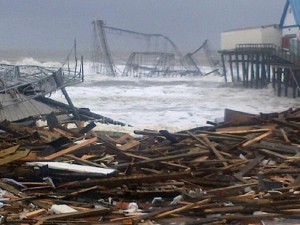 Sandy may be the most expensive hurricane in United States history. According to economists at Moody’s Analytics, losses are estimated to be near $50 billion with $30 billion attributable to property losses and the remaining $20 billion due to losses in economic activity. The process of picking up the pieces and rebuilding will be costly, both emotionally and financially. While most homeowners will rely on reimbursements from insurance companies to fund repairs, many will end up paying substantial out-of-pocket expenses for costs that might not be covered. If you find yourself in this unfortunate position, a portion of these unreimbursed expenses may be tax deductible as a casualty loss on your taxes.
Sandy may be the most expensive hurricane in United States history. According to economists at Moody’s Analytics, losses are estimated to be near $50 billion with $30 billion attributable to property losses and the remaining $20 billion due to losses in economic activity. The process of picking up the pieces and rebuilding will be costly, both emotionally and financially. While most homeowners will rely on reimbursements from insurance companies to fund repairs, many will end up paying substantial out-of-pocket expenses for costs that might not be covered. If you find yourself in this unfortunate position, a portion of these unreimbursed expenses may be tax deductible as a casualty loss on your taxes.
What’s a loss?
According to the IRS, a casualty loss is the damage, destruction or loss of property resulting from an identifiable event that is sudden, unexpected or unusual. While Sandy obviously falls into this category, calculating your loss for tax purposes can be difficult.
Losses to personal property including your home will be based upon the decline in fair market value of the property. Determining the decline in fair market value requires you to calculate the difference between the property value immediately before and after the loss occurred. The loss is limited to the property’s adjusted basis, which is often the purchase price plus any capital improvements made. Generally, your deduction will be reduced by any insurance reimbursements, another $100, and then by 10 percent of your adjusted gross income.
Let’s review an example: Assume a taxpayer with adjusted gross income of $80,000 suffers a loss of $75,000 to their home. $40,000 is covered by insurance leaving them with $35,000 of unreimbursed losses. Subtract $100 and 10 percent of the taxpayer’s adjusted gross income ($8,000) and they are left with $26,900 of deductible losses. Remember, you must itemize your deductions to take advantage.
While the loss usually must be claimed for the tax year when the incident occurs, areas declared a federal disaster by the president may allow you to deduct the losses on either your 2011 or 2012 return, whichever saves you more money. Despite requiring you to file an amended return, deducting losses on your 2011 tax return could be to your advantage. Visit www.fema.gov/disasters to see if your area was declared a disaster area by the president and consider reviewing IRS Publication 547 for complete details on the process.
Document, document
It is critically important to thoroughly document your losses. Remember, you must be able to prove and substantiate the fair market value of your property before and after the loss using appraisals, receipts and any additional supporting documentation. Also, consider taking numerous pictures as evidence for your losses. Bottom line: The more evidence supporting the valuation of your assets and damage incurred, the better.
TAX RELIEF
Due to the severity of Sandy’s effects, the IRS will provide some tax relief for taxpayers in areas that were hard hit. According to Certified Public Accountant Dawn Connolly of Darcy and Connolly CPAs, “Because Hurricane Sandy has been designated a ‘qualified disaster’ for federal income tax purposes, contributions that qualify as disaster relief payments made to an individual by employers or other persons can be excluded from those individuals’ taxable income.”
Qualified disaster relief payments include amounts to cover necessary personal, family, living or funeral expenses that were not covered by insurance. Also included are costs associated with the rehabilitation of personal residences or expenses to repair or replace the contents that were not covered by insurance.
In addition, some tax filing deadlines are being extended including fourth quarter estimated payments. Those payments previously due Jan. 15, 2013, will not be due until Feb. 1, 2013. Many states are adjusting deadlines as well. Gov. Chris Christie has chosen to approve hardship waivers for late filers on a case by case basis while also extending the deadline for tax filings that were due Oct. 31 to Nov. 14.
For additional information or to discuss your circumstances, consider contacting the IRS at www.IRS.gov and the N.J. Division of Taxation at (609) 292-6400.
While taxes may be the last thing on your mind during this difficult time, proper planning and an understanding of casualty losses can help reduce the net cost of this disaster to you and your family. Because each person’s circumstances and losses are unique, consider speaking to your tax adviser to ensure that you are properly deducting losses attributable to Hurricane Sandy.
Kurt J. Rossi, MBA, is a Certified Financial Planner Practitioner. He can be reached for questions at 732-280-7550 & kurt.rossi@Independentwm.com. LPL Financial Member FINRA/SIPC.









